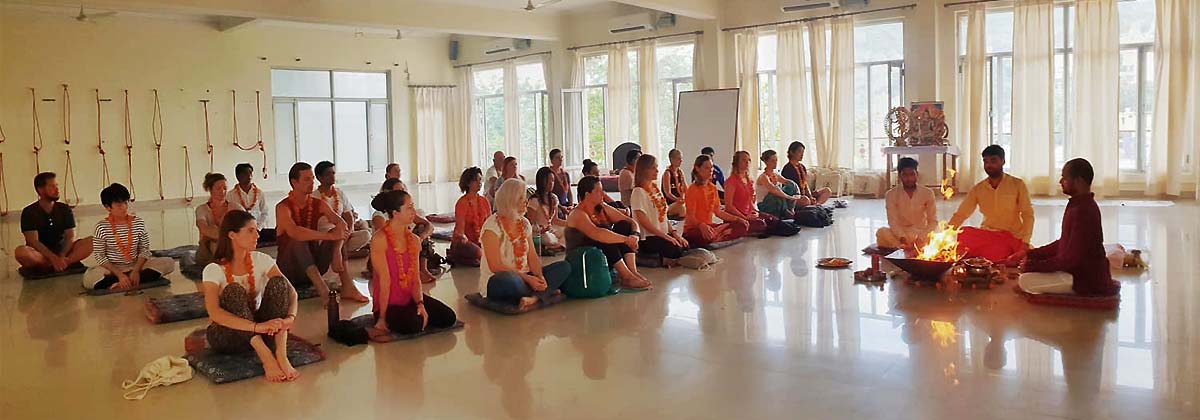300 Hour Yoga TTC
Advanced 300 Hour Hatha Yoga & Ashtanga Yoga Teacher Training in Rishikesh, India

Traditional Hatha and Ashtanga 300 & 500 Hour Yoga Teacher Training Program
Shiva Yoga Peeth offers 300 Hour Advanced Yoga Teacher Training program. Join our Yoga Alliance International approved school for advanced multi-style Hatha and Ashtanga 300 hour Yoga Teacher Training courses for their 500 hour certificate. This advanced course is wonderful for students of all levels as well as for teachers who have completed their 200 Hour Yoga Teacher Training either at Shiva Yoga Peeth or another certified facility.

Objective of 300 hour Yoga teachers In India course
Our 300 hr Yoga Teacher Training Course (YTTC) is a 4 week intensive program of study designed to deepen your already existing knowledge and foundation of Yoga. Students must have already completed a 200 hr Yoga TTC in any style in order to enroll as a student and prepare you for a more advanced personal and professional investigation into the transformative power of yoga: in body, mind and soul.
The body is a stunning expression of geometry and taking your knowledge of alignment to an advanced level will enable you to work with new and advanced students alike in a far more specific way.
The electives offered in this major will allow you to refine your eye, offer profound and dynamic adjustments, and targeted modifications for students working with injures and other limitations. You will also learn to use props to support students at all levels of practice to reach a much deeper understanding of each pose.
Curriculum – 300 Hour Yoga Teacher Training
|
*The 500 Hour Yoga Training Course Curriculum is a combination the 200 Hour Yoga Teacher Training Course Curriculum and the 300 Hour Course Curriculum. Syllabus may change according to the situation.
300 hour Yoga Teacher Training Curriculum
Practice
Anatomy
Yoga Philosophy
Teaching Methodology
4 Week Curriculum
Practice
Practice
1) Asanas (Postures): You will learn Many postures of Ashtanga, Iyengar, and Hatha Yoga.
Study various asanas and the technique of teaching the postures, the benefits of each posture, modifications, contraindications, and the use of props.
- Standing poses.
- Sitting poses, forward bends and hip openers.
- Sitting/supine twists.
- Back bends.
- Inversions.
- Arm balances.
- Restorative postures.
2) Adjustment: Learn how to adjust these asanas and understand how adjustment can deepen your practice.
3) Pranayama (Breathing Techniques): These are based on traditional yogic breathing techniques which will benefit your yoga practice as you learn how to lengthen your breath. How to incorporate breathing into postures and into your classes. How breath work assists the body.
4) Shatkarma (Cleansing Techniques): These yogic cleansing practices will be integrated into the daily morning schedule and will work in conjunction with the asana practices. These will purify the nervous system and allow your breath to flow freely throughout the body. In expelling toxins from the body, we therefore cleanse it.
5) Yogic Mudras (Energy Seals): Stimulate different parts of the body by sealing in the energy. These are usually used in Pranayama and affect the flow of prana.
6) Bandhas (Energy Locks): How they regulate the flow of energy and assists the practitioner in asana.
7) Meditation: You will cover a range of meditation techniques that will help build concentration and focus in your daily practice. Techniques include Om Chanting, Chakra, candlelight Meditation.
8) Mantras (Chanting): A range of mantras will be taught including the Gayatri Mantra and many more. Find your inner harmony in these sessions.
Anatomy
Anatomy
You will learn anatomy relevant to yoga in order to strengthen the classroom explanations, cues, and corrections of asanas.
- Yoga and Skeletal System, Brain & Nervous System, Respiratory System, Digestive System, Cardiovascular System.
- Effects of kriya, Pranayama, Asanas and Meditation for various disorders.
- Subtle Body Anatomy of the chakras, nadis and the application of chakras energy in the practice of Yoga.
- Introduction to Ayurveda & Yogic Diet.
Yoga Philosophy
Yoga Philosophy
This class will focus on introducing you to the basic philosophy, concepts and history of yoga. It will cover the various traditional philosophies and viewpoints, insights from modern research and ways in which the essence of this holistic life-view can be integrated into a modern lifestyle.
- Yoga Sutras (Preface of Patanjali’s yoga Sutra): Study this important text based on the 8 limbs of Ashtanga Yoga. Discover the theory and foundations of yoga as Patanjali describes how to make a connection with the body, mind and spirit.
- Kriya Yoga a methodology to overcome Panch-klesha (5 causes of pain and miseries)
- Raj yoga and Hatha yoga
Teaching Methodology
Teaching Methodology
Class Observation: You will observe a Class given by one of our experienced yoga teachers as inspiration for the class that you will then prepare.
Teaching Methodology: This class will give you the necessary building blocks to devise your own yoga class. Learn how to motivate your students by teaching inclusively to the range of abilities that you may be faced with.
Peer Teaching: These sessions allow you to practice your teaching skills and get constructive feedback from both your Senior Teachers and your peers on your progress.
Adjustment: Learn how to help your students get deeper into a posture through adjustment.
- Studying yoga lifestyle and the ethics of a yoga teacher
- Studying the attitude and presence of the teacher
- The seat of yoga teacher/teaching as service/why we teach/creating a sacred space
- Ethical guidelines for the student teacher relationship
Creating a class/Sequencing/General teaching points
- Elements of great teaching.
- Classroom organization and set up.
- Creating a class plan.
- Teaching progressively focusing on alignment principles.
- The basic principles of sequencing.
Yoga Teaching Practicum
- Practicing teaching with RYT/ERYT.
Karma yoga. - Receiving/giving feedback.
- Group teaching during class hours.
4 Week Curriculum
Syllabus of Yoga Courses |
|||||||||||||||||||||||||||||||||||||||||||||||||
A. Introduction to Ayurveda
B. Systems
C. Various Darshans
|
|||||||||||||||||||||||||||||||||||||||||||||||||
